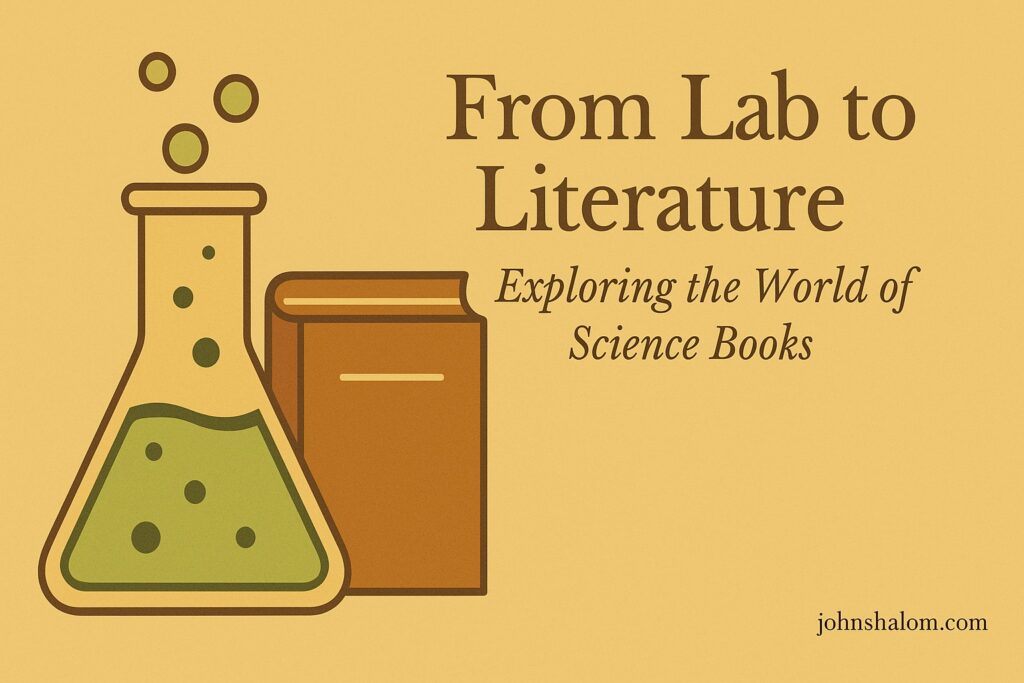
TL;DR:
Science writing turns data into wonder. These books showed me that behind every experiment is a story of curiosity, failure, and triumph. When science meets storytelling, even atoms feel alive. The best science books don’t just explain—they ignite imagination and make readers fall in love with discovery.
Introduction: The Journey from Research to Readability
Science books serve as a bridge between the academic world and the general public, transforming complex research and discoveries into engaging, accessible narratives. They take readers on a journey through the intricacies of science, offering insights into everything from the mysteries of the universe to the intricacies of human biology. Whether you’re a science enthusiast, an avid reader, or someone looking to expand their knowledge, science books provide a rich and rewarding experience.
In this article, we’ll delve into the world of science books, exploring their various genres, notable works, and the skills required to write compelling science literature. Let’s embark on this literary adventure and uncover the fascinating stories that bring science to life.
FAQs: From Lab to Literature: Exploring the World of Science Books
1. What makes science books engaging?
They turn technical details into relatable stories, helping readers see how science shapes everyday life and the human experience.
2. How can writers make science accessible?
By using clear language, analogies, and storytelling to simplify without dumbing down the subject.
3. What are some must-read science books?
Top picks include The Selfish Gene by Richard Dawkins, A Short History of Nearly Everything by Bill Bryson, and The Immortal Life of Henrietta Lacks by Rebecca Skloot.
4. Why is storytelling important in science writing?
Because stories give facts meaning—people remember emotions and context long after numbers fade.
5. Who should read or write science books?
Scientists, educators, and anyone curious about the natural world who believes knowledge should inspire, not intimidate.
The Importance of Science Books: Making Science Accessible
Science books play a crucial role in making scientific knowledge accessible to a broader audience. They help demystify complex concepts, inspire curiosity, and promote a deeper understanding of the world around us. Here are some reasons why science books are essential:
1. Educating the Public
Science books provide valuable educational resources for readers of all ages. They cover a wide range of topics, from fundamental principles to cutting-edge discoveries, making science accessible to everyone.
2. Inspiring Curiosity
By presenting science in an engaging and relatable manner, science books inspire curiosity and a love for learning. They encourage readers to ask questions, explore new ideas, and seek a deeper understanding of the natural world.
3. Promoting Scientific Literacy
Scientific literacy is essential for informed decision-making and critical thinking. Science books help readers develop the skills to evaluate scientific information, understand research findings, and apply scientific principles to everyday life.
4. Bridging the Gap Between Scientists and the Public
Science books serve as a bridge between the scientific community and the general public, translating technical jargon into understandable language. They provide a platform for scientists to share their work and communicate its significance to a wider audience.

Genres of Science Books: Exploring the Diversity
Science books come in various genres, each offering a unique perspective on scientific topics. Here are some of the key genres of science books:
1. Popular Science
Popular science books aim to make complex scientific concepts accessible to a general audience. They are written in an engaging and relatable style, often using storytelling techniques to capture readers’ attention. Popular science books cover a wide range of topics, from physics and astronomy to biology and environmental science.
2. Biographies and Memoirs
Biographies and memoirs of scientists provide an intimate look at the lives and careers of notable figures in the scientific community. These books explore the personal journeys, challenges, and achievements of scientists, offering readers insights into their motivations and contributions to science.
3. History of Science
Books on the history of science delve into the development of scientific ideas and discoveries over time. They explore the historical context, key events, and influential figures that have shaped the course of scientific progress. These books provide a deeper understanding of how science has evolved and its impact on society.
4. Science Fiction
Science fiction blends imaginative storytelling with scientific concepts, exploring futuristic scenarios and speculative ideas. While science fiction is primarily a genre of fiction, it often incorporates real scientific principles and theories, inspiring readers to think about the possibilities of the future.
5. Technical and Academic Books
Technical and academic science books are geared towards professionals, researchers, and students in the field. These books provide detailed and rigorous explanations of scientific concepts, research methodologies, and technical applications. They are essential resources for advancing knowledge and expertise in specific areas of science.

Notable Science Books: Must-Reads for Every Science Enthusiast
The world of science books is vast and diverse, with numerous standout titles that have made a significant impact. Here are some notable science books that every science enthusiast should consider reading:
“A Brief History of Time” by Stephen Hawking
Stephen Hawking’s “A Brief History of Time” is a groundbreaking book that explores the nature of the universe, black holes, and the concept of time. Hawking’s ability to explain complex theories in a clear and engaging manner has made this book a classic in popular science literature.
“The Selfish Gene” by Richard Dawkins
In “The Selfish Gene,” Richard Dawkins introduces the concept of the gene-centered view of evolution. The book provides a compelling explanation of how genes drive the process of natural selection and shape the behavior of living organisms. Dawkins’ thought-provoking ideas have had a profound influence on evolutionary biology.
“The Immortal Life of Henrietta Lacks” by Rebecca Skloot
Rebecca Skloot’s “The Immortal Life of Henrietta Lacks” tells the story of Henrietta Lacks, whose cancer cells were taken without her knowledge and used for scientific research. The book explores the ethical and social implications of medical research, as well as the impact of Lacks’ cells on scientific advancements.
“Silent Spring” by Rachel Carson
Rachel Carson’s “Silent Spring” is a seminal work that brought attention to the environmental impact of pesticides. The book played a crucial role in the environmental movement and led to changes in policies and regulations. Carson’s powerful writing and compelling arguments have left a lasting legacy.
You might also like: Creative Nonfiction Series: What It Is and Its Importance for You
“Sapiens: A Brief History of Humankind” by Yuval Noah Harari
In “Sapiens,” Yuval Noah Harari takes readers on a journey through the history of the human species, from the emergence of Homo sapiens to the present day. The book explores the key developments that have shaped human history, including the cognitive revolution, the agricultural revolution, and the rise of modern societies.

Crafting Compelling Science Books: Tips and Techniques
Writing a science book requires a combination of scientific knowledge, storytelling skills, and a passion for communication. Here are some tips and techniques to help you craft compelling science books:
1. Choose a Fascinating Topic
Select a topic that fascinates you and has the potential to captivate your audience. Whether it’s a specific scientific discovery, a historical event, or a broad concept, choose a subject that ignites your curiosity and passion.
2. Research Thoroughly
Thorough research is the foundation of a great science book. Gather information from reputable sources, such as academic journals, books, and interviews with experts. Ensure that your research is accurate, comprehensive, and up-to-date.
3. Simplify Complex Concepts
Break down complex scientific concepts into simple, digestible pieces. Use analogies, metaphors, and examples to help readers understand difficult ideas. Avoid jargon and technical language unless it is necessary, and always define key terms.
4. Use Engaging Storytelling
Incorporate storytelling techniques to make your writing more engaging. Start with a compelling hook, build tension and intrigue, and create vivid descriptions that bring your topic to life. Use anecdotes and real-life examples to illustrate your points.
5. Focus on the Human Element
Highlight the human element in your book. Science is driven by people—researchers, scientists, and individuals affected by scientific discoveries. Share their stories, experiences, and motivations to create a more relatable and emotional connection with your readers.
6. Edit and Revise
Editing and revising are essential steps in the writing process. Review your work for clarity, accuracy, and readability. Ensure that your arguments are well-supported, your explanations are clear, and your writing flows smoothly. Seek feedback from peers and mentors to improve your work.

The Impact of Science Books: Beyond the Page
Science books have a profound impact on readers and society as a whole. Here are some ways in which science books go beyond the page:
1. Empowering Readers
Science books empower readers by providing them with the knowledge and tools to understand the world around them. They equip readers to make informed decisions about their health, environment, and technology.
2. Sparking Curiosity and Innovation
By highlighting the wonders and mysteries of science, science books spark curiosity and innovation. They encourage readers to ask questions, explore new ideas, and pursue careers in science and technology.
3. Fostering Informed Citizenship
Science books foster informed citizenship by helping readers understand the scientific issues that affect their lives and society. They promote critical thinking and evidence-based decision-making, contributing to a more knowledgeable and engaged public.
4. Building a Connection with Science
Science books build a connection between readers and the scientific community. They help bridge the gap between experts and the public, fostering a sense of trust and appreciation for the scientific process.
Conclusion: Celebrating the World of Science Books
Science books are a powerful and essential genre that brings the wonders of the universe to life. They go beyond the complexities of scientific concepts to reveal the beauty, curiosity, and human stories behind the discoveries. Whether you’re a writer, a reader, or a lover of science, the world of science books offers a wealth of inspiration and knowledge.
So, the next time you pick up a science book, take a moment to appreciate the art and effort that goes into decoding the universe for you. Happy reading, and may your curiosity continue to lead you on exciting journeys of discovery!


